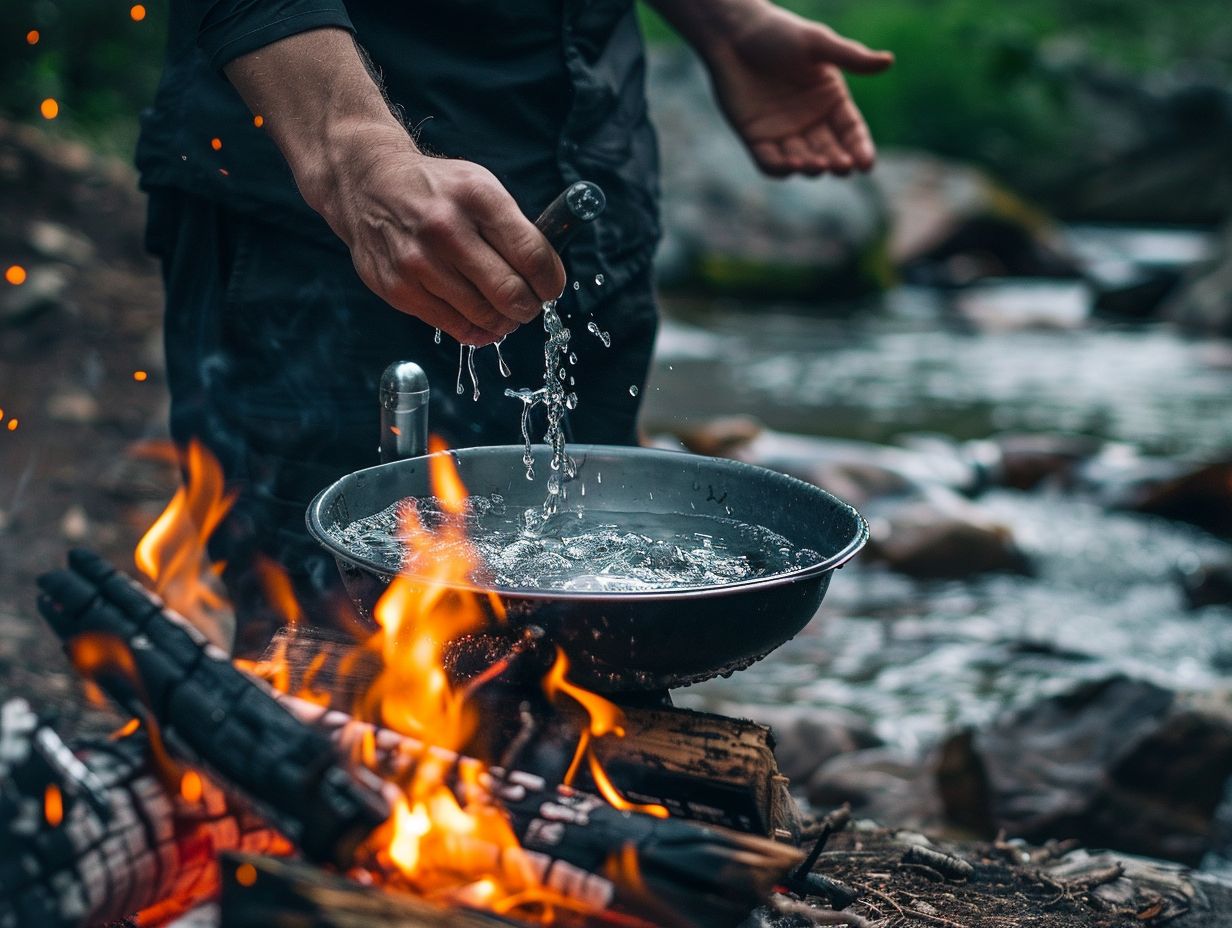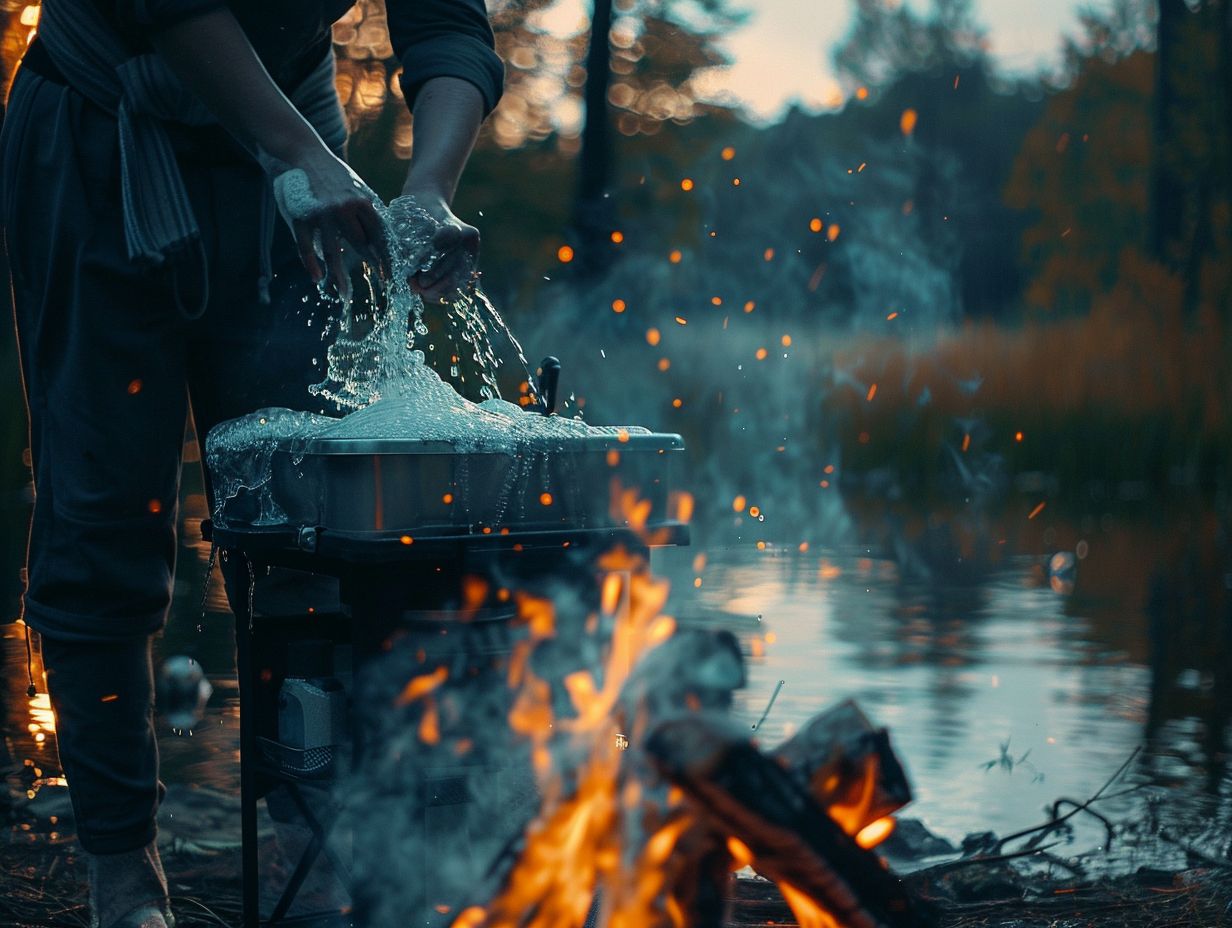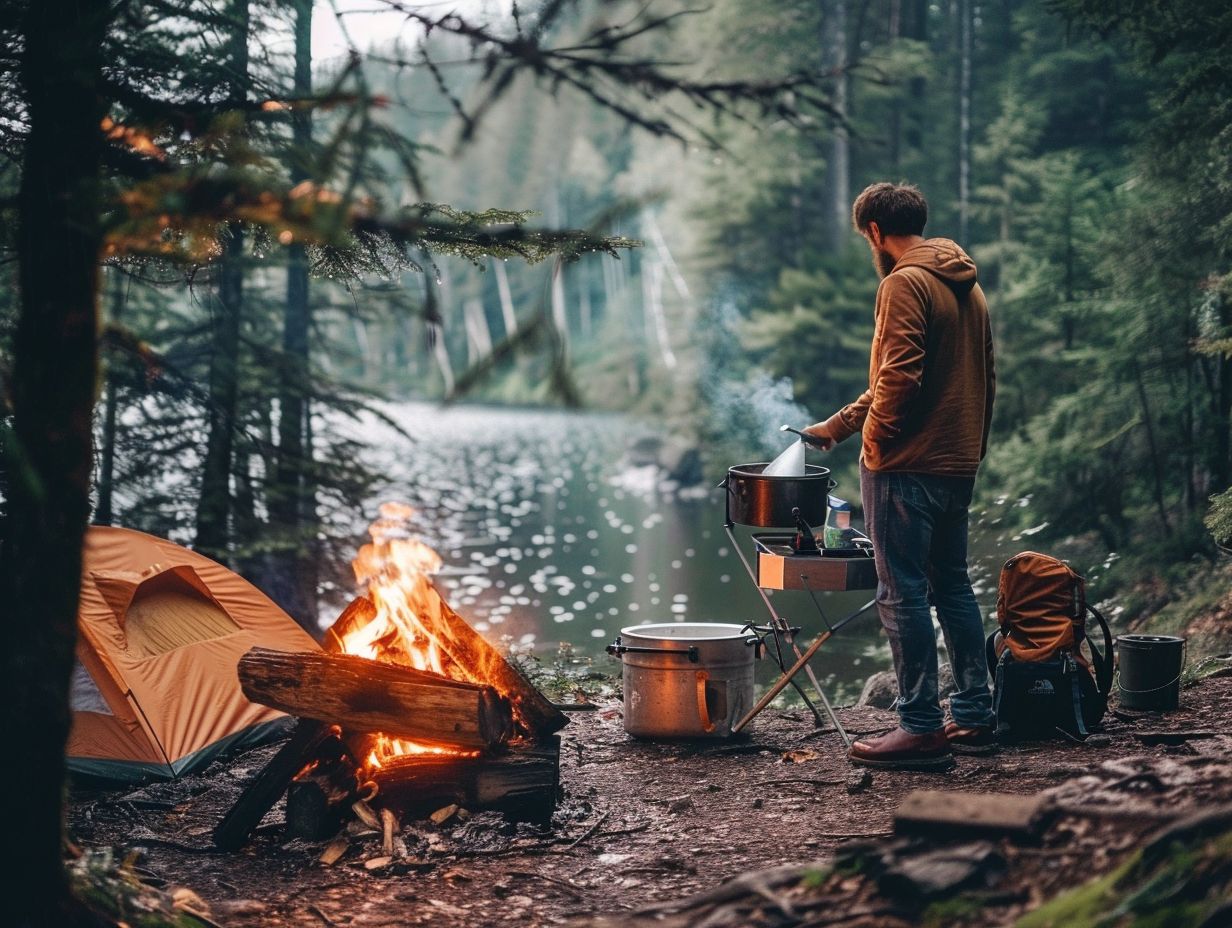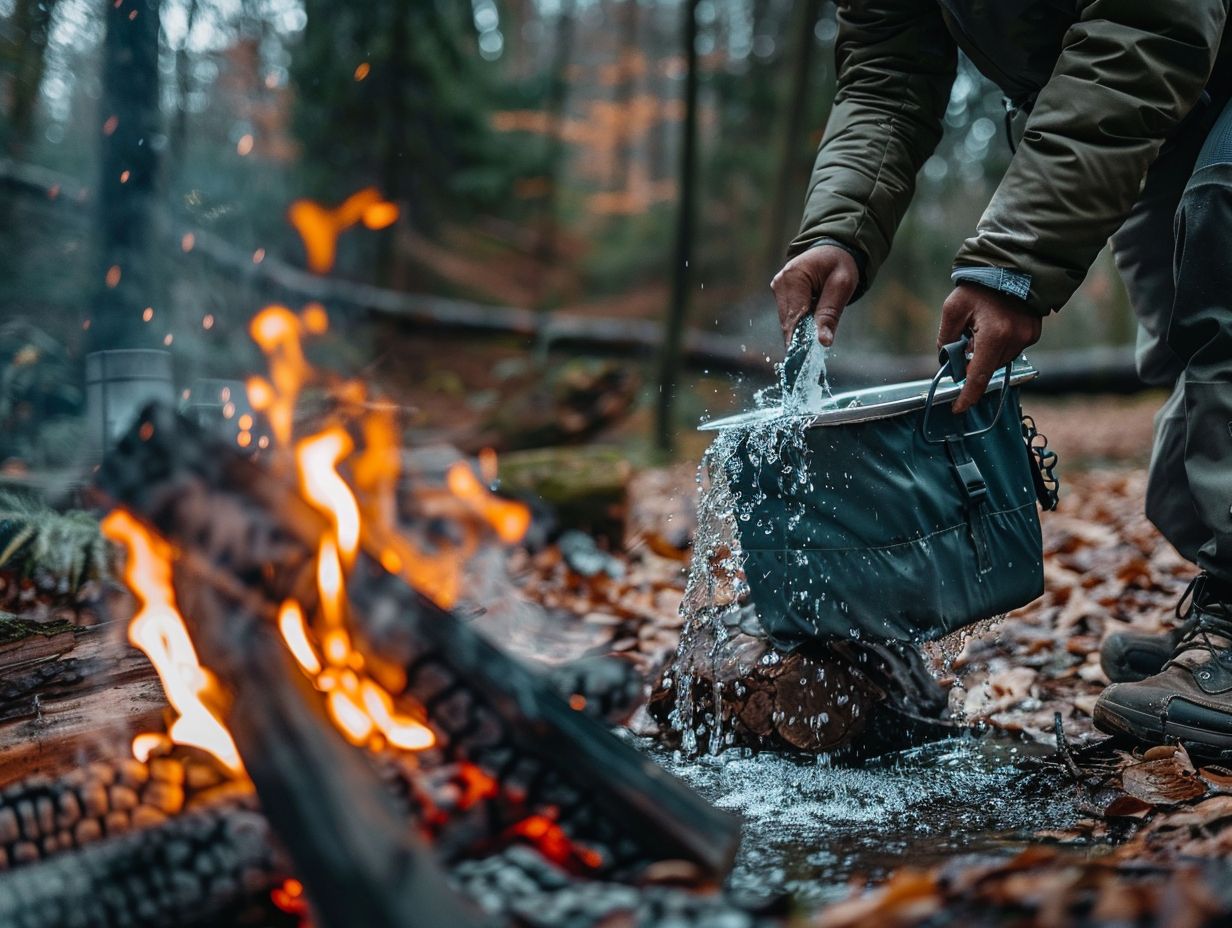When it comes to camping, maintaining personal hygiene may present challenges. However, with the appropriate strategies, you can ensure cleanliness even in the wilderness. This article presents 15 crucial tips for preserving cleanliness and freshness while camping, covering topics such as packing essential hygiene products and showing consideration for fellow campers and the environment.
Prepare your gear and anticipate a hygienic and comfortable camping adventure ahead.
Key Takeaways:

- Pack the right hygiene essentials, including biodegradable soap and wet wipes, to keep yourself clean while camping.
- Choose a campsite with access to clean water and a suitable area for a portable handwashing station.
- Practice good bathroom etiquette, dispose of waste properly, and stay hydrated to maintain personal hygiene while camping.
1. Pack the Right Hygiene Essentials
When preparing for camping, it is crucial to pack the appropriate hygiene essentials to ensure a clean and comfortable experience in the midst of nature.
Biodegradable soap should be included in your supplies to facilitate washing your hands and body without causing harm to the environment, thereby helping to maintain ecosystem balance.
Additionally, make sure to bring hygiene products such as toothpaste and toothbrushes to maintain fresh breath and oral health, which are vital for overall well-being. Baby wipes are useful for quick clean-ups, especially when water access is limited, providing a refreshing feeling.
Hand sanitizer is essential for germ elimination and illness prevention, promoting personal health and the well-being of those in your vicinity.
2. Choose the Right Campsite
Choosing the right campsite is essential for enhancing your camping experience, ensuring you have access to clean water sources and a picturesque natural setting. Having a campsite located near water sources offers not only convenience for cooking, drinking, and washing but also contributes to the overall ambience of your outdoor getaway.
Imagine waking up to the soothing sounds of a nearby stream or enjoying a tranquil lakeside view while savouring your morning coffee.
Opting for such a location allows you to fully immerse yourself in nature, providing a sense of peace and tranquillity that is unparalleled by more urban campgrounds. Keep in mind that the proximity to clean water and scenic surroundings can significantly impact your camping adventure.
3. Set Up a Portable Handwashing Station
When you are camping and facing limited clean water sources, creating a portable handwashing station is a practical way to maintain cleanliness and hygiene. One effective method to set up a handwashing station is by using a camping shower or a large collapsible water container equipped with a tap.
Start by filling the container with clean water, placing biodegradable soap within easy reach, and positioning a small basin underneath to collect wastewater. This setup enables campers to conveniently wash their hands, encouraging good hygiene practices in outdoor settings.
Establishing a dedicated handwashing station not only helps in preventing the transmission of germs and bacteria but also ensures that campers can prioritize their health and fully enjoy their outdoor excursions.
4. Bring Biodegradable Soap and Shampoo
Opting for biodegradable soap and shampoo during camping trips aligns your hygiene routine with nature conservation principles. These environmentally friendly products, like those offered by Dr. Bronner’s and Campsuds, are specifically formulated to naturally break down without causing harm to the environment.
By choosing these products, you not only lessen your ecological impact but also play a role in protecting delicate ecosystems. The formulations of these brands are devoid of harmful chemicals, ensuring they are gentle on both your skin and the environment.
When preparing for your next camping excursion, consider making the switch to biodegradable options for a hygienic experience that also upholds environmental sustainability.
5. Use Wet Wipes for Quick Clean-Ups

Carrying wet wipes provides a convenient solution for quick clean-ups and maintaining hygiene standards whilst camping, offering you a simple way to freshen up when access to showers is limited. These versatile wipes can be useful for various outdoor activities, such as hiking, picnicking, or attending festivals. They effectively remove dirt, sweat, and grime, leaving you feeling fresh and clean on the go.
Whether you need to wipe down equipment, refresh after a workout, or tidy up before a meal, wet wipes serve as a practical and portable hygiene essential. Their compact size makes them easy to carry in your rucksack, gym bag, or car, ensuring you can stay clean and refreshed wherever your adventures take you.
6. Keep Your Sleeping Area Clean
Ensuring cleanliness in your sleeping area is crucial for a comfortable camping experience. This involves regular tidying up and changing of clothes to uphold hygiene standards.
To further improve the cleanliness of your sleeping space, consider using a sleeping bag liner. This can help prevent sweat and dirt from accumulating inside your sleeping bag.
Changing into fresh clothes before entering your sleeping quarters can significantly reduce the transmission of outdoor germs and bacteria to your bedding.
Another useful tip is to store any dirty or used items in Ziploc bags. This helps contain odours and prevents contamination of the rest of your gear.
Keep in mind that a clean sleep environment is essential for a restful night’s sleep and overall well-being while camping.
7. Dispose of Waste Properly
Proper waste disposal practices are imperative for preserving the environment while camping, promoting sustainability and eco-friendliness in outdoor activities. A crucial aspect of responsible waste management when camping is to always carry out your rubbish, ensuring that no litter is left behind to disrupt the natural beauty of the surroundings.
Recycling whenever possible can significantly reduce the environmental impact of your trip, aiding in the minimisation of waste sent to landfills. By adhering to these practices, campers demonstrate respect for the environment and wildlife that inhabit these areas, leaving no trace of their presence and fostering a cleaner, healthier ecosystem for all to enjoy.
8. Keep Your Hands Clean Before and After Eating
Maintaining clean hands before and after meals is crucial for preventing contamination and upholding food hygiene standards during your camping adventures.
Practising good hand hygiene not only protects your health by reducing the risk of harmful bacteria and viruses being transferred from your hands to your food, but it also plays a significant role in safeguarding the health of those sharing meals with you.
By using hand sanitisers or washing your hands with soap and water, you contribute to a safer and healthier camping experience for everyone involved. Remember, personal hygiene is a fundamental aspect of responsible food handling, both in preparation and consumption.
9. Use Natural Deodorants
Opting for natural deodorants, such as bicarbonate of soda, essential oils, and plant-based extracts that effectively combat odours without the use of harsh chemicals. By selecting Arm & Hammer products, you not only prioritise your personal hygiene but also contribute to a healthier environment.
Traditional deodorants may contain chemicals like parabens and aluminium, which can potentially have adverse effects on both your skin and the environment. In contrast, natural deodorants are gentle on the skin, making them a suitable choice for individuals with sensitive skin or allergies.
10. Stay Hydrated and Drink Clean Water

To maintain optimal hydration levels during camping trips, it is crucial for you to prioritize staying hydrated by accessing and consuming clean water from reliable sources. Whether you are exploring challenging terrain or enjoying a lakeside retreat, it is essential for you to carry a durable water bottle to ensure a consistent water supply.
Additionally, investing in water purification techniques like filters or purifying tablets can help make water from natural sources such as streams or lakes safe for consumption.
Familiarizing yourself with safe drinking water sources in the vicinity, such as designated water stations or natural springs, is also important to mitigate the risks of dehydration or waterborne illnesses.
11. Keep Insects and Bugs Away
Preventing insect bites and keeping bugs at bay is crucial for your comfort and well-being during outdoor activities like camping. It is essential to implement effective strategies to repel pests.
One effective method to deter insects is to use insect repellents that contain DEET or picaridin, as these have proven to be effective against mosquitoes, ticks, and other pests.
Additionally, wearing long-sleeved shirts, trousers, and closed-toe shoes can provide physical protection against bug bites. Setting up mosquito nets around sleeping areas or utilising mosquito coils and citronella candles can help create a barrier between you and the insects.
These preventative measures are vital in ensuring a pleasant and bug-free outdoor experience for both campers and hikers.
12. Take a Dip in Natural Bodies of Water
When engaging in camping expeditions, you may find that swimming or bathing in natural bodies of water can serve as an invigorating method of maintaining hygiene and cleanliness, all while basking in the beauty of pristine environments.
Immersing yourself in a natural lake or river not only aids in cleansing accumulated dirt and sweat, but also offers a tranquil and authentic experience that artificial settings cannot replicate. The cool, clear water provides a refreshing escape from the heat, making it an ideal way to cool off and relax on a hot day.
It is crucial to exercise caution and follow safety protocols when participating in water-related activities. This includes ensuring appropriate supervision for children and being mindful of water quality to mitigate potential health risks.
13. Change Clothes Regularly
Regular clothing changes, especially to moisture-wicking clothes, are essential for maintaining comfort, hygiene, and temperature regulation during your camping trips in various weather conditions.
Moisture-wicking fabrics play a crucial role in outdoor clothing as they efficiently wick away sweat and moisture from your body, keeping you dry and preventing chafing and irritation. Staying dry is not only about comfort but also about safety, as wet clothing in cold conditions can lead to hypothermia.
By selecting appropriate attire for different activities, you can ensure maximum performance and protection. Whether you are hiking, biking, or climbing, having the right clothing can enhance your experience and make your outdoor adventures more enjoyable.
14. Practice Good Bathroom Etiquette
Observing good bathroom etiquette is essential for maintaining hygiene standards and respecting shared facilities during camping, promoting a clean and pleasant environment for all campers.
One key tip for outdoor bathroom etiquette is to always use biodegradable toiletries to reduce environmental impact and keep nature pristine. It’s crucial to clean up after yourself by properly disposing of waste and wiping down any surfaces you may have used.
Remember to give others space by not lingering in shared facilities unnecessarily and being mindful of noise levels. Respecting the privacy of others is also paramount, so be sure to close doors properly and wait your turn if facilities are occupied.
By practising these simple guidelines, you contribute to a positive camping experience for everyone.
15. Be Mindful of Others and the Environment

Being mindful of others and the environment is crucial for fostering a harmonious and clean camping experience, encouraging responsible behaviour and conservation efforts in natural settings. By following the principles of Leave No Trace, you can minimise your impact on the surroundings. Sustainable camping practices involve using biodegradable products, leaving campsites as you found them, and respecting wildlife habitats.
It is essential to practise responsible waste management by properly disposing of rubbish and packing out all items brought into the wilderness. Maintaining a low profile in nature and reducing noise pollution are key components of respectful camping behaviour, ensuring a peaceful atmosphere for all visitors.
Environmental stewardship in outdoor recreation is vital for preserving the beauty and integrity of natural landscapes for future generations to enjoy.
Frequently Asked Questions
What are some basic personal hygiene tips for camping?
Some basic tips for maintaining personal hygiene while camping include bringing biodegradable soap, using hand sanitizer, bringing a portable shower, wearing clean clothes, and properly disposing of waste.
How often should I wash my hands while camping?
You should wash your hands before and after preparing food, after using the bathroom, and after handling any dirty items. Aim to wash your hands at least 3-4 times a day while camping.
How can I keep my teeth clean while camping?
One way to keep your teeth clean while camping is by bringing travel-sized toothpaste and a toothbrush. You can also use a water bottle and some salt to create a natural mouthwash. Remember to dispose of the water properly after use.
Are there any tips for staying clean while hiking or exploring?
Yes, some tips for staying clean while hiking or exploring include using biodegradable wipes, changing into clean socks regularly, and avoiding touching your face with dirty hands. Additionally, try to avoid walking through mud or puddles to keep your clothes and shoes clean.
How can I properly dispose of waste while camping?
For solid waste, be sure to dig a hole at least six inches deep and cover it with soil afterwards. For liquid waste, be sure to dispose of it in a designated area or bury it in a cat hole. Do not leave any waste on the ground or in the water.
What should I do if I run out of clean water while camping?
If you run out of clean water while camping, you can use water purification tablets or a portable water filter to make water safe for drinking. You can also boil water for at least one minute to kill any harmful bacteria. Avoid drinking water from lakes, rivers, or streams without properly purifying it first.



